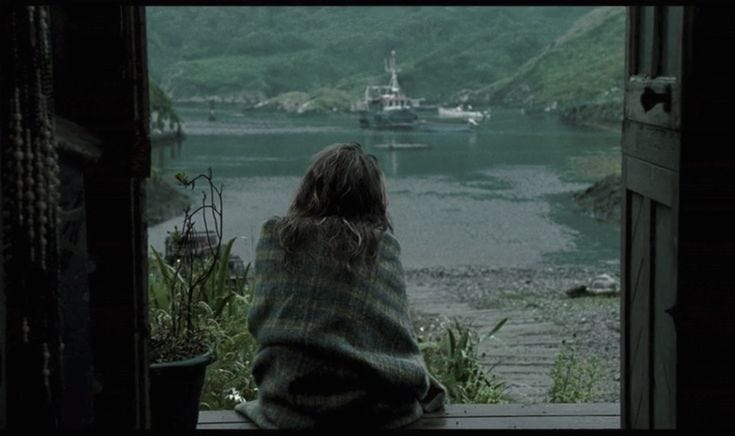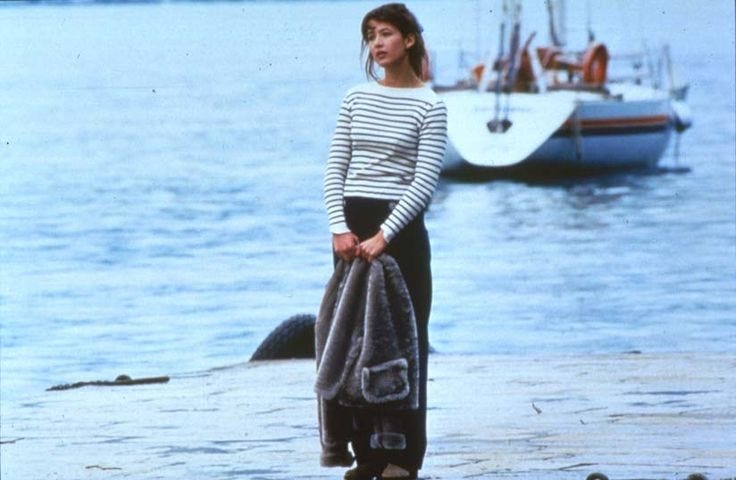it’s strange how long it takes to realize that you’re not chasing goals, you’re chasing a feeling. you say you want to finish the draft, land the deal, check the box, build the business. but what you’re really trying to do is feel okay. to feel like you’re not falling behind. to quiet the buzzing in your chest that won’t let you sit still unless you’re doing something impressive. something that justifies your existence in a world that equates usefulness with worth. and you call it ambition because that’s what we’ve been taught to call it; this hypervigilance, this compulsive forward motion. the grind is never questioned, only aestheticized.
i didn’t always know i was measuring my life in units of productivity. i thought i was just “driven” but over time, the scoreboard started to look less like a path forward and more like a cage, one where the bars were made of bullet journals, late-night panic scrolls, abandoned self-help systems, and guilt over things i hadn’t even committed to. it didn’t matter that i was getting things done. i was exhausted. my days were full, but my mind wasn’t free. and even when i did manage something impressive, the satisfaction was so fleeting it felt like emotional clickbait. i’d feel proud for maybe four minutes and then i’d remember everything i hadn’t done. at some point, and i’m not sure exactly when, i started to wonder: what if the feeling i’ve been calling “success” was just temporary relief from self-inflicted pressure? what if the real win wasn’t getting everything done, but no longer needing to prove that i can? that’s where peace entered the chat. but peace, unlike productivity, doesn’t come with a dopamine high. it doesn’t pat you on the back or get algorithmic applause. peace is subtle. it’s the absence of urgency. the ability to eat lunch without checking your email. to not spiral when someone posts their milestone. to walk without headphones. to lie in bed and not narrate your rest as a “reset.” peace is boring to others, which is probably why we overlook it. you can’t screenshot it. but you feel it when it’s there — and even more so when it’s not.
we live in a culture that worships productivity as a form of virtue. hustle is romanticized. burnout is rationalized. you’re told to “earn rest” as if being a living organism isn’t enough. we organize our lives around output, and then feel ashamed when we’re not keeping pace with a version of ourselves that maybe never existed. even rest becomes performative: a wellness routine, a scheduled “wind down,” an instagrammable bath. nothing is sacred if it isn’t optimized. capitalism, of course, thrives on this: the idea that you should be doing more. it’s not just about making money. it’s about internalizing a belief that your value depends on your output. but even beyond economics, there’s a deeper, quieter force at play: productivity shame. that familiar guilt you feel on a “lazy day.” the awkwardness of saying “i did nothing” when someone asks how your weekend was. the defensiveness that creeps in when you see someone else being “more consistent” than you.
in psychological research, this has a name. in a 2020 study by psychologists rebecca j. shankland and christophe andré, they coined the term “performance-based self-worth”: the belief that one’s value is contingent on achievement. they found that people who internalize this belief experience higher levels of anxiety, perfectionism, and burnout regardless of how much they actually accomplish. in short, the grind doesn’t just steal your time. it slowly corrodes your sense of self.
even tech culture reflects this. the rise of “life optimization” apps has taught us to gamify our lives; to treat health, attention, and habits as things to conquer. there’s nothing wrong with tools but there’s something deeply wrong with a system where you feel like a failure because you didn’t close your rings or stack your habits perfectly. we’ve replaced reflection with metrics. healing with hustle. presence with proof. but let’s be clear: peace isn’t the same as doing nothing. it’s not lazy. it’s not passive. it’s not the absence of ambition, it’s the transformation of it. peace, in this context, is a relationship with time that’s not dictated by fear. it’s the ability to say, “i can rest now” without asking if you’ve earned it. it’s choosing to speak slower, scroll slower, even type slower not because you’re inefficient, but because your nervous system deserves gentleness. it’s the kind of ambition that’s rooted in clarity, not panic.
some of the most resonant thinkers, creators, and visionaries have operated from this place. zadie smith, who takes long breaks between books, once said that writing, to her, is more about patience than performance. the poet ocean vuong described his writing process as “pausing long enough to hear the quiet.” even in spiritual traditions, peace has always been the prerequisite not the reward. thich nhat hanh wrote over 100 books not because he was prolific, but because peace was his rhythm. “peace is not the end of the path,” he said. “peace is the path.” in fiction, too, the characters we fall in love with are often the ones who pause. jo march in little women, scribbling in the attic while life moves on below her. nora seed in the midnight library, suspended between timelines, quietly asking what makes a life worth living. these stories endure not because of how much the characters do but because of how deeply they feel. how clearly they see. how softly they move through a world that demands speed.
so that got me thinking… what if we started measuring our days not by how productive they were, but by how peaceful they felt? that shift would change everything. we’d start checking in with our bodies more than our inboxes. we’d feel the tightness in our jaw before we said yes to another favor we didn’t mean to commit to. we’d allow space for “empty” hours where nothing gets done but everything softens. staring at the ceiling. peeling fruit in silence. standing in the shower for a little too long. and not needing to narrate it as “self-care.” just letting it be life. peace as a metric also creates room for being human during the parts of life that don’t make good content. the months where you’re caregiving. the years you’re grieving. the weird, transitional gaps where you feel like you’re floating. productivity collapses in those moments. but peace can still be cultivated. because peace isn’t about what you’re doing. it’s about how gently you’re willing to be with yourself when you don’t know what comes next.
for me, that shift started with micro-decisions. saying no to projects that looked good on paper but felt misaligned. letting myself work slower. embracing the idea that a “quiet day” could be a successful one. i stopped narrating my week in deliverables and started noticing how my body felt on thursday afternoons. i stopped trying to prove i was disciplined and started focusing on whether i was present. i still fall back into the trap. of course i do. the world rewards speed and sparkle and visibility. it’s easy to forget that slowness is sacred. that presence is powerful. that worth is not a prize to win but a place to return to. so when i catch myself sprinting for no reason, i return to this truth: productivity is often fear in disguise. peace is trust. and trust is what makes life feel like it belongs to you again.
so, how do you actually build a peace-first life?
not in one go. not by quitting your job or moving to a cottage in the hills. but by layering small, sensory, emotional decisions into the architecture of your day. here’s what’s worked for me and others who are trying to live from that same inner place:
protect one hour a day for absolutely nothing. no phone. no improvement. no productivity guilt. just quiet. boredom, even. it rewires you.
stop reacting to urgency like it’s truth. just because something feels urgent doesn’t mean it’s important. peace often lives behind the second breath.
build rituals instead of routines. make your morning coffee a ceremony. turn washing your face into an act of devotion. not everything needs to be optimized. some things just need to be enjoyed.
pay attention to how things feel, not how they look. a clean desk that feels like pressure isn’t peaceful. a messy table that feels like play is.
define success by how kind you were to yourself. not how much you did. not how many people noticed. just: were you gentle today?
if you’re looking for books to support this shift and explores a peace-first life (also makes you feel things)
Open Water by Caleb Azumah Nelson
Told in second person, this is a love story written with the emotional precision of poetry. It’s about vulnerability, masculinity, black identity, and what it means to be seen. But more than that, it’s about slowness, about letting love unfold without force. A book that makes you breathe differently.
The Midnight Library by Matt Haig
This one went viral for a reason. It's the story of Nora Seed, who gets to experience every possible version of her life and realizes that regret and ambition are not always the same thing. It's the kind of book that reminds you productivity is not the point. Being alive is.
Eleanor Oliphant Is Completely Fine by Gail Honeyman
An unexpected one. Eleanor’s world is small, strange, and structured but underneath it all is quiet grief, slow healing, and the awkward beauty of being human. It’s a gentle, humorous, and deeply emotional reminder that a meaningful life can be very, very ordinary.
Everything I Know About Love by Dolly Alderton (a memoir)
This isn’t fiction, but it reads like it could be. Dolly writes about female friendship, self-discovery, and romantic chaos with wit and tenderness. The earlier chapters are wild and messy, but the later ones are soft and reflective, perfect for anyone in a season of growing out of performance and into presence.
If you’d like to share your own peace-first rituals or books that shifted your mindset, you can drop them in the comments. I always love reading how others are learning to move slower, softer, and more deliberately.
That’s it for today. Thank you for being here. I’ll see you in the next one.










Several years ago one of my insightful friends told me to “quit keeping score”. Makes more sense now. Thanks for this! Very impactful! ❤️
To quit the Matrix is my goal 🥹❤️